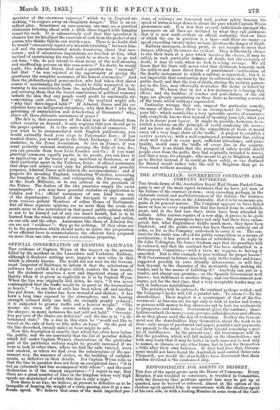RESPONSIBILITY FOR AGENTS IN BRIBERY.
THE fear of the agent grows upon the House of Commons. Every Member, if not troubled in conscience, is troubled in Committee, with the discovery that petitions against him may be got up or quashed, may be waived or enforced, almost at the option of the election.agent against him, in coneurrene,e with the election-agent of his own side, or with a leading Member in some room of the Carl- ton Club. Mr. Coppock's assertion, that he had a list of boroughs from A to 37, which might be disposed of, was not half so alarming as Mr. Brown's intimation that any petition against a Member ought to succeed.
It happens in some cases that the Member is unseated when he has practically as well as professedly no knowledge or intention of bribery ; and it equally happens, that the constituency may be de- prived of its Member and troubled with a fresh election when the great bulk of the electors are innocent of complicity. A great pub- lic offence is committed—the Member is unseated, the constituency troubled—and yet the very instrument which brought this about escapes with impunity : the agent incurs no penalty, he only has an increase of business. If the Member be detected, he is dis- qualified from sitting—if the voter be detected, he is disqua- lified from voting: why should not the same rule apply to the most culpable party in the whole affair—if the agent be detected in procuring bribery, why should not he be disqualified from agency?



























 Previous page
Previous page